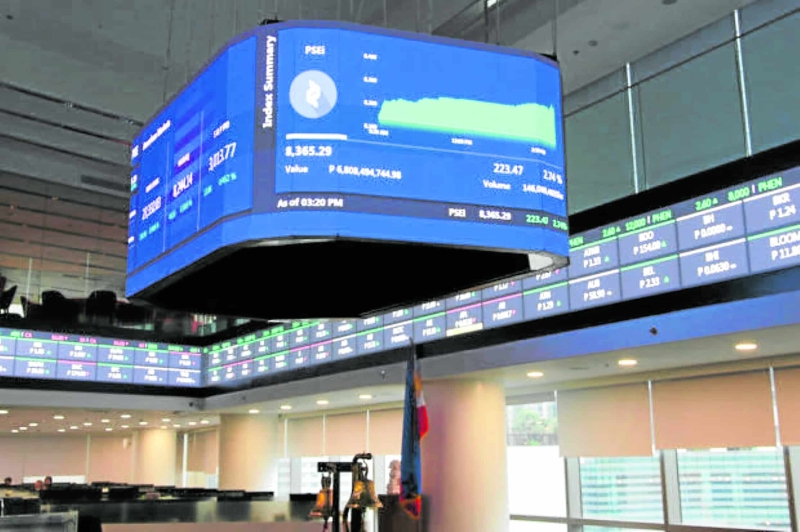MAYBE NEXT YEAR Deloitte says the Southeast Asian initial public offerings market in general was tepid in 2024, with total capital raised reaching its lowest in nine years. —INQUIRER FILE PHOTO
Once, in the early months of 2024, the Philippine Stock Exchange (PSE) made a bold move, targeting six initial public offerings (IPOs) for a total equity deal of P40 billion.
And for a while there, the bourse seemed to be performing as analysts expected. In September, the benchmark Philippine Stock Exchange Index (PSEi) even managed to charge into the bull territory and closed as high as 7,500 after the Bangko Sentral ng Pilipinas (BSP) started its long-awaited easing cycle.
But now, the local stock barometer seems to have gone back to levels seen when the market was at its weakest in 2024.
From enjoying the view at its peak of 7,500, the PSEi is now settling near the bottom of its uphill climb after falling by around 12 percent in just two months.
This downfall has made it less attractive for companies, particularly the big names, to pursue an IPO before the year ends.
Global advisory firm Deloitte found in a report that the case was not confined to the Philippines alone.
In fact, Deloitte says the Southeast Asian IPO market in general remained tepid in 2024, with the total capital raised reaching its lowest in nine years.
The region saw 122 IPOs in the first 10 months of the year worth $3 billion.
This is down from 163 IPOs in 2023 worth $5.8 billion.
The Philippines did not fare well versus its neighbors: the country only saw three IPOs, while Malaysia accounted for 46 IPOs in the region. Indonesia had 39, and Thailand saw 29 companies go public.
Manila’s three IPOs—OceanaGold Philippines Inc. in May, Citicore Renewable Energy Corp. in June, and NexGen Energy Corp. in July—totaled P11.86 billion in proceeds.
The giants, such as the SM Group’s real estate investment trust and Ayala-backed e-wallet GCash, opted out of a 2024 IPO.
Challenging
PSE president Ramon Monzon himself admitted that the year was challenging for the bourse, citing high interest rates early in 2024 and the stock market’s resulting volatility as among the deterrents for IPO candidates.
But why is it hard to make the market attractive for Philippine corporations?
Wendy Estacio-Cruz, research head at Unicapital Securities Inc., notes that “several headwinds” emerged, including the political leadership shift in the United States.
“This could affect the inflation trend due to potential tariffs. As a result, the US [Federal Reserve] and the BSP are now anticipating a slower pace of interest rate cuts, which dragged the index,” Cruz says in a message.
As it is, the BSP cut rates for overnight borrowing thrice in 2024 for a total of 75 basis points to 5.75 percent.
While there is room for three quarter-point rate cuts in 2025, experts say investors are still wary of US President-elect Donald Trump’s protectionist policies.
“This year’s market narrative was shaped largely by a tug-of-war between persistent macro uncertainties and selective growth stories,” says Jayniel Carl Manuel, equities trader at Seedbox Securities Inc.
Indeed, not all companies benefited from interest rate cuts.
In its latest Philippine Market Strategy Report, COL Financial Group Inc. points out that listed companies grew slower in the first nine months of 2024 versus the previous year.
During the period, these firms grew by 5 percent against 10.5 percent in the first quarter and 9.6 percent in the first semester.
While property firms are usually among those that cheer lower borrowing costs, President Ferdinand Marcos Jr.’s ban on Philippine offshore gaming operators offset growth, according to Manuel.
“With a shift in policy leading to their reduced footprint, that once-solid source of demand has faded, leaving developers to contend with high vacancy rates and cooling investor interest,” he adds.
The COL report likewise notes that consumer firms “delivered the worst performance” among all the sectors due to high inflation.
Banks had the opposite fate. As of the January to September period, nearly all banks listed on the PSE saw record-high earnings, with powerhouses BDO Unibank Inc., Bank of the Philippine Islands and Metropolitan Bank and Trust Co. all expecting to shatter their full-year record.
But despite the sour turn of events in 2024, the PSE and experts alike are seeing a better 2025 ahead.
Monzon says the anticipated easing inflation, interest rate cuts and the PSE’s upcoming products may be enough to entice investors back into equities.
The President expects Philippine equities to grow next year despite high anxiety over the US elections. According to Monzon, they are targeting a 52-percent surge in capital raised from the market to P120 billion.
Further correction
Meanwhile, Cruz cautions that the PSEi may continue correcting “for some time.”
“We recommend investors to keep some cash or assets in reserve, ready to take advantage of opportunities when market conditions improve,” she says.
Still, Unicapital is keeping its 8,000 index target, driven by a projected 10-percent growth in corporate earnings.


